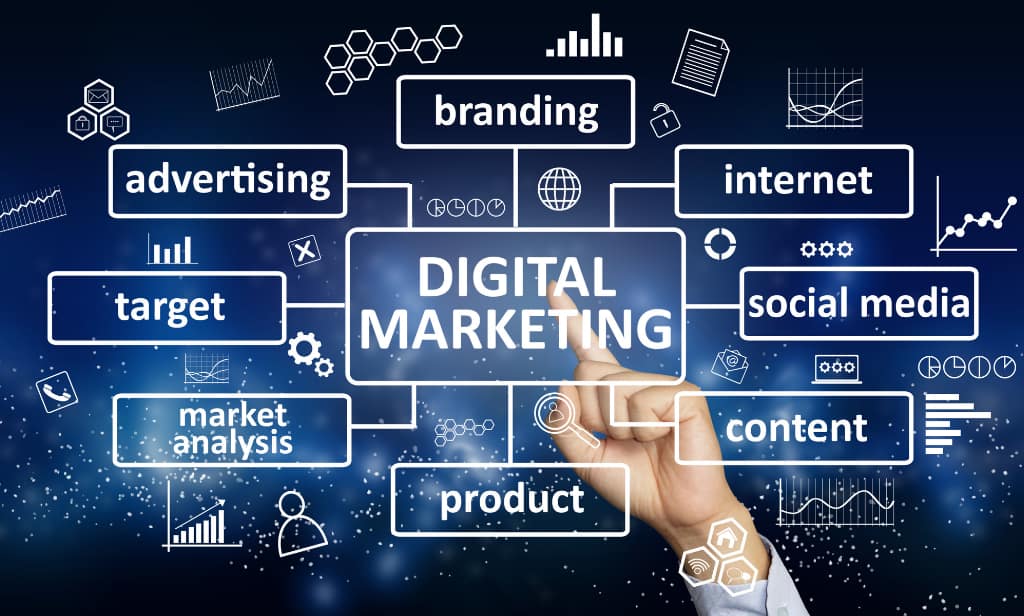What is Digital marketing?
Digital marketing refers to the use of digital channels, such as search engines, social media, email, and websites, to promote a product or service. It encompasses a wide range of activities, including search engine optimization (SEO), pay-per-click advertising (PPC), social media marketing, content marketing, and email marketing. The goal of digital marketing is to connect with customers where they spend time online and to build brand awareness, drive website traffic, and ultimately increase sales.
Types of digital marketing services
There are many types of digital marketing services, including:
- Search Engine Optimization (SEO): Optimizing a website’s content and structure to improve its ranking in search engine results pages (SERPs).
- Pay-Per-Click Advertising (PPC): Running ads on search engines and other websites that charge a fee each time the ad is clicked.
- Social Media Marketing: Promoting a product or service through social media platforms such as Facebook, Twitter, Instagram, and LinkedIn.
- Content Marketing: Creating and distributing valuable, relevant, and consistent content to attract and engage a specific target audience.
- Email Marketing: Sending promotional or informative emails to a list of subscribers.
- Influencer Marketing: Partnering with individuals who have a large following on social media to promote a product or service.
- Affiliate Marketing: Partnering with other businesses to promote their products or services and earning a commission for each sale.
- Video Marketing: Creating and distributing videos to promote a product or service.
- Mobile Marketing: Reaching customers on their mobile devices through SMS, mobile apps, and mobile websites.
- Online Reputation Management (ORM): Monitoring and managing a company’s online reputation and brand.
Note that this list is not exhaustive and new forms of digital marketing services may appear in the future.

How digital marketing helps company to scale up their business?
Digital marketing can help companies scale up their business in a number of ways:
Cost-effective: Digital marketing is generally less expensive than traditional marketing methods and allows companies to reach a larger audience at a lower cost.
Targeted reach: With digital marketing, companies can target specific segments of their audience based on demographics, interests, and behavior. This allows for a more efficient use of marketing resources and a higher likelihood of reaching the desired audience.
Measurable results: Digital marketing campaigns can be easily tracked and measured, allowing companies to quickly identify which strategies are working and which are not. This enables them to make data-driven decisions and optimize their marketing efforts.
Increased brand awareness: Digital marketing can help companies increase their brand visibility and reach new customers through various channels such as search engines, social media, and online advertising.
Increased customer engagement: Digital marketing channels such as social media and email marketing allow companies to interact with customers in real-time and build relationships through personalized and relevant content.
Increased sales: By reaching the right audience with the right message, digital marketing can help companies increase sales and revenue.
Diversification of revenue streams: Digital marketing can help companies diversify their revenue streams by exploring new market segments and expanding into new channels, such as e-commerce.
Better customer insights: Through digital marketing, companies can gather data on customer behavior, preferences and feedback, which can be used to improve products and services, and to create more effective marketing campaigns.
Overall, digital marketing can be a powerful tool for companies looking to scale up their business and reach new customers.
What is min investment in digital marketing?
The minimum investment in digital marketing can vary greatly depending on the specific tactics and strategies being used. Some digital marketing channels, such as social media marketing and content marketing, can be done with little to no budget, while others, such as pay-per-click advertising and search engine optimization, may require more significant investments.
For example, a small business can start with creating a free website and then use social media platforms like Facebook, Instagram, Twitter, and LinkedIn to promote their products or services, with little to no cost. They can also create and share valuable and relevant content for their target audience on their blog or website, this is also called Content marketing.
On the other hand, if a business wants to run a pay-per-click (PPC) campaign, it will require a budget to pay for each click on the ad. The cost per click can vary depending on the keywords and the industry.
In general, the minimum investment for digital marketing will depend on the size and goals of the business, as well as the tactics and strategies being used. However, it’s important to keep in mind that a lower budget does not mean that you can’t achieve your goals, but it will require more creativity, planning and time investment on your side.
